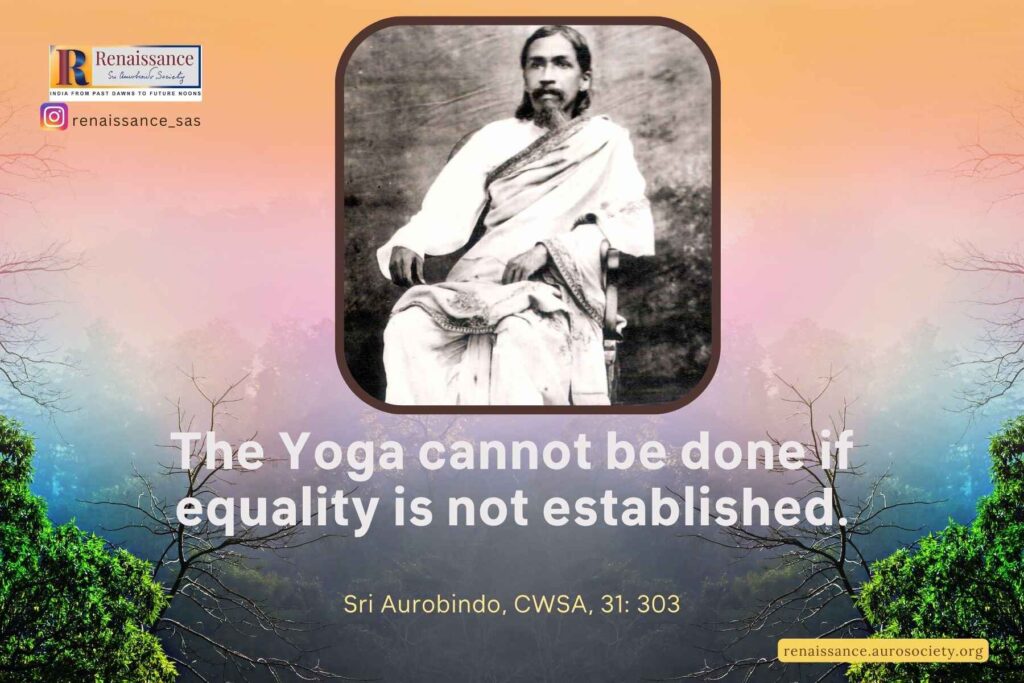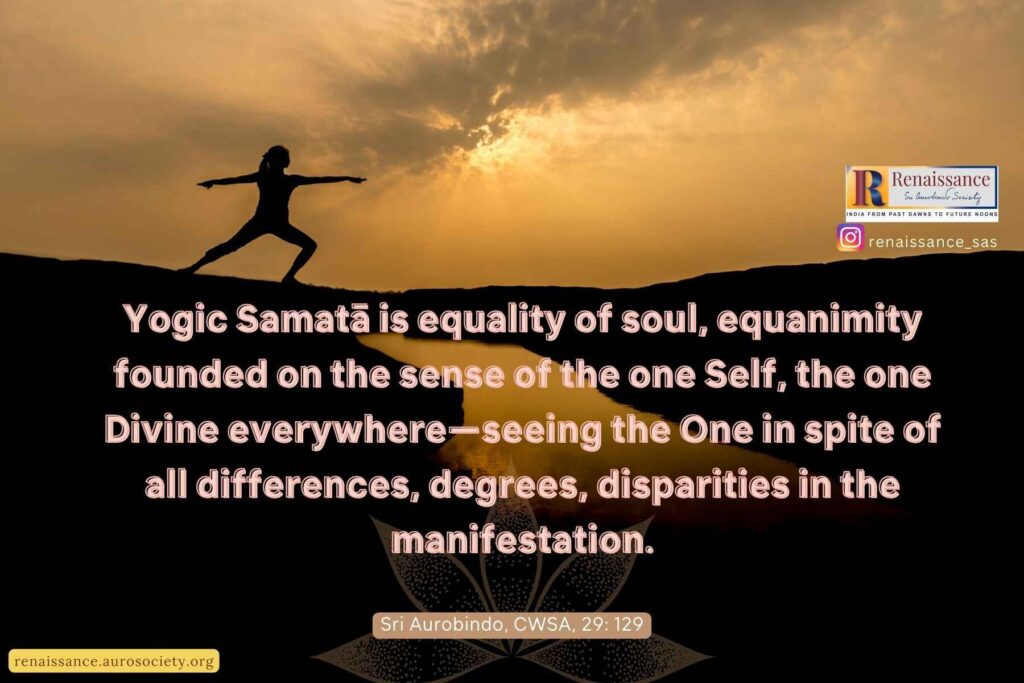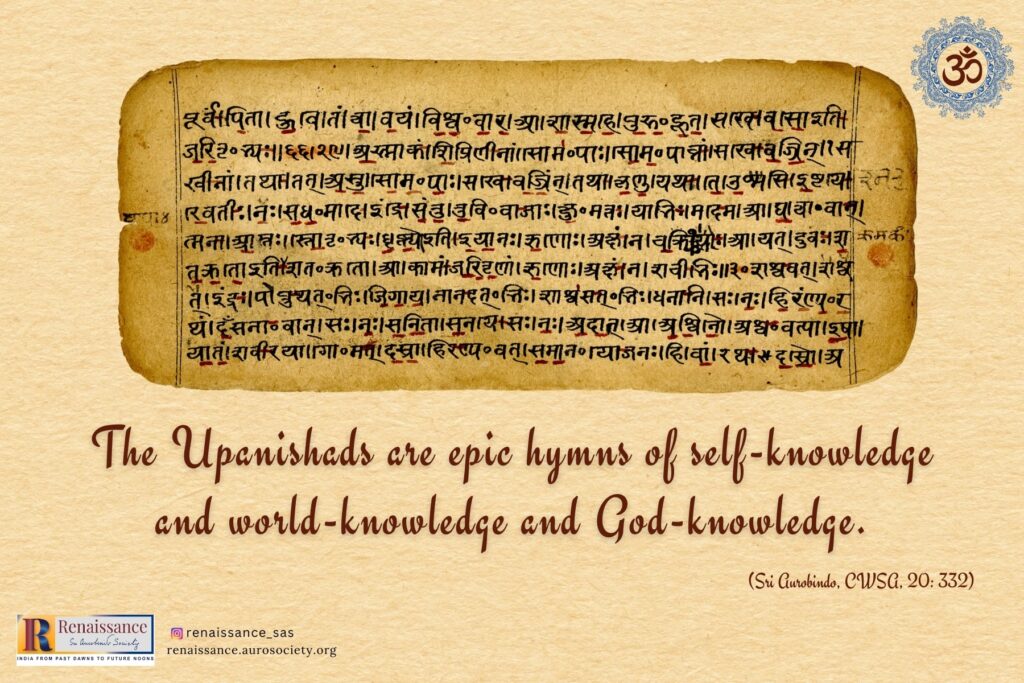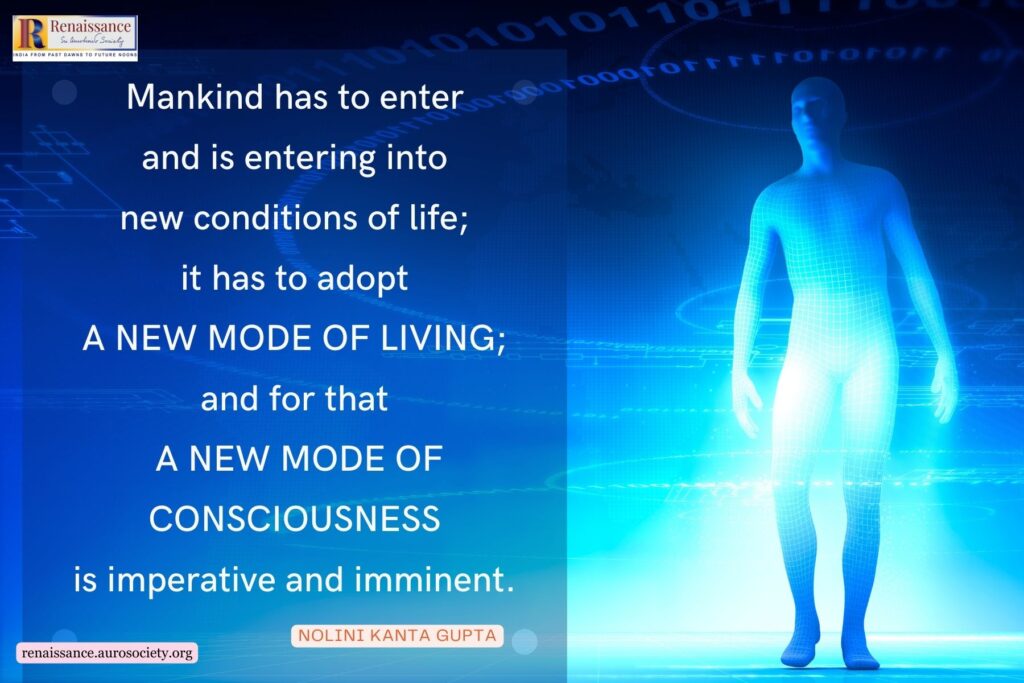Sri Aurobindo once defined Equality in a letter to a disciple:
“Yogic Samata is equality of soul, equanimity founded on the sense of the one Self, the one Divine everywhere — seeing the One in spite of all differences, degrees, disparities in the manifestation.”
(CWSA, Vol. 29, p. 129)
Why are we usually so unmindful of this Equality in our day-to-day life?
Let us begin by meditating upon some of the Vedantic Mahavākyas (the great truth-filled utterances or statements). It must be added that to understand ‘Equality’ it is necessary to understand the concept of ‘Unity’ because one leads to the other. Equality exists because of the underlying Oneness in existence.
सर्वं खल्विदं ब्रह्म | Sarvam Khalvidam Brahma | All this is Brahman | Chāndogya Upaniṣad (III.14.1)
Consciousness is all there is. All is One, One is All. Everything comes from Brahman, everything goes back to Brahman, and everything is sustained by Brahman. The Divinity of God resides in the souls of all. It is innate in all living and non-living forms and also the transcendent.
Then the question arises who are you? Or who am I?
Upanishads affirm: You are (also) That.
तत् त्वम् असि | Tat Tvam Asi | You are That. | Chāndogya Upaniṣad (VI.8.7)
The Self is everywhere and in everything. But there is, in reality, nothing apart from the Self. Everything is the Self. Chāndogya Upaniṣad says even the multiplicities of names and forms are also the Self.
ईशा वास्यं इदं सर्वं (īśā vāsyamidaṁ sarvaṁ) is the first mantra of the īśopaniṣad. It means everything in the entire universe is pervaded by God Consciousness. Another verse in the īśopaniṣad reiterates this idea differently – He who sees all beings in the Self itself, and the Self in all beings, feels no hatred by virtue of that wisdom.
Bhagavad Gita says: ईक्षते योगयुक्तात्मा सर्वत्र समदर्शनः
The man whose self is in Yoga, sees the self in all beings and all beings in the self, he is equal-visioned everywhere. (Chapter 6, Verse 29)
Coming closer to our times, Swami Vivekananda also said – “Physically this universe is one: there is no difference between the sun and you.” (Raja Yoga, Chapter 3, Complete Works, Vol. 1, p. 151)
Sri Aurobindo had a concrete experience and realization of this Unity and Equality in Alipore jail.

He spoke about this in his Uttarpara speech after his acquittal in 1909:
“…I looked at the jail that secluded me from men and it was no longer by its high walls that I was imprisoned; no, it was Vasudeva who surrounded me. I walked under the branches of the tree in front of my cell but it was not the tree, I knew it was Vasudeva, it was Sri Krishna whom I saw standing there and holding over me his shade. I looked at the bars of my cell, the very grating that did duty for a door and again I saw Vasudeva. It was Narayana who was guarding and standing sentry over me. Or I lay on the coarse blankets that were given me for a couch and felt the arms of Sri Krishna around me, the arms of my Friend and Lover.
This was the first use of the deeper vision He gave me. I looked at the prisoners in the jail, the thieves, the murderers, the swindlers, and as I looked at them I saw Vasudeva, it was Narayana whom I found in these darkened souls and misused bodies.”
(CWSA, Vol. 8, p. 5)
He then recounted what he experienced later when the trial began in the lower court and he was brought before the Magistrate:
“I looked and it was not the Magistrate whom I saw, it was Vasudeva, it was Narayana who was sitting there on the bench. I looked at the Prosecuting Counsel and it was not the Counsel for the prosecution that I saw; it was Sri Krishna who sat there, it was my Lover and Friend who sat there and smiled.”
(CWSA, Vol. 8, p. 6)
Again the voice of God inside Sri Aurobindo said to him:
“Now do you fear? I am in all men and I overrule their actions and their words. My protection is still with you and you shall not fear.”
(CWSA, Vol. 8, p. 6)
Sri Aurobindo had a very real experience and realisation of that ‘ekatvam’ (oneness) and ‘samatvam’ (equality) resulting in ‘sama-drishti-bhāva’ (seeing all with an equal vision) even in the most trying conditions.
We find him explaining this samatvam or samatā in a letter many years later:
“Not to be disturbed by either joy or grief, pleasure or displeasure by what people say or do or by any outward things is called in Yoga a state of samatā, equality to all things. It is of immense importance in sadhana to be able to reach this state.”
(CWSA, Vol. 31, p. 335)

Sanatana Dharma teaches us that the Divine is present in all.
Imbibing the spirit of Equality destroys attachment, eradicates dichotomies of likes and dislikes. With the destruction of attachment and the calming down of likes and dislikes, purity is attained.
Equality is the seed of purity and helps us avoid unnecessary conflicts of the ego – me versus you, us versus them, man versus woman, and other such things. A pure mind and heart are the ground in which blossom true virtues that are at the core of Sanatana Dharma viz., kindness, compassion, love, helpfulness, selflessness, generosity etc.
The truly learned, those endowed with the eyes of divine knowledge see with an equal vision a Brahmin, a cow, an elephant, a dog, and a dog-eater, says the Bhagavad Gita in fifth chapter.
So, why do we forget these fundamental principles in our daily life?
If it is merely because of ignorance, then let us acquire this knowledge. However, many of us, despite having this knowledge or information, we keep forgetting all about it while going through the daily grind of life.
We get drawn into the whirlpool of this transactional (vyavahārika) samsāra. And we get into the matrix of “I, Me and Mine” and “I am the doer” mentality with our ego and desires. Sri Krishna says very succinctly in the Bhagavad Gita – “Samatvam yoga uchyate” (it is Equanimity/ Equality that is meant by yoga).
Reflecting on Sri Aurobindo’s experience in Alipore jail we recognize the need to develop a sense of equanimity by having an equal attitude towards all events. This means facing everything with an unaltered peace. Equality can be achieved only by developing a blissful inner spiritual worldview with an acceptance of all God’s workings within and around us.
It is not merely a stoic attitude. It requires us to become conscious of the hidden, underlying reality behind all circumstances in our lives.
Sri Ramakrishna Paramahamsa once gave the allegory of a mother of an infant baby. While being engaged in her daily chores, she still has her mind fixed upon her baby whom she had left in a cradle in order to complete her work. The baby is slightly away from the mother, but the mother in her mind is constantly thinking of the baby – what is he doing, what toy he is playing with, etc. This is how the mind has to be fixed on that which is hidden behind the outer circumstances and events.
It does not mean that the outer circumstances or happenings are not real. Or that there is no difference in the manifestation. Let us recall what Sri Ramakrishna says in The Gospel of Sri Ramakrishna:
“Why should the universe be unreal? That is a speculation of the philosophers. After realizing God, one sees that it is God Himself who has become the universe and all living beings.”
Only through regular and devoted sadhana we can become progressively conscious of the underlying fundamental reality of Unity and Equality, despite the outer diversity.
It is easy to get drawn into this worldly life with its pulls of nāma (names), rupa (forms) and karma (or Causality). These three things are responsible for all the visible diversity which we perceive through our mind and senses.
For instance, it is quite easy to distinguish the body of a man from that of a woman. But it is not so easy to distinguish their mind or senses. Further, it becomes even more difficult to fathom their egos (aham) and intelligence (buddhi), which are considered the higher tattvas of Nature.
At a still deeper level of pure consciousness or witness consciousness, the distinction completely disappears, since the self has no gender, name or form. In other words, gender distinctions are superficial. They are confined to the body and to the objective reality of the mind, where names and forms still matter. Deep inside all are same.

I conclude with an interesting yet practical story from ‘Tales and Parables Of Sri Ramakrishna’.
There was once a holy man who had many disciples. One day he taught them to see God in all beings and knowing this, to bow low before them all. A disciple went to the forest to gather wood for the sacrificial fire. Suddenly he heard an outcry: “Get out of the way! A mad elephant is coming!”
All but the disciple of the holy man took to their heels. He reasoned that the elephant was also God in another form. Then why should he run away from it? He stood still, bowed before the animal, and began to sing its praises.
The mahout (person who controls the elephant sitting on its back) was shouting: “Run away! Run away!” But the disciple didn’t move. The animal seized him with its trunk, cast him to one side, and went on its way. Hurt and bruised, the disciple lay unconscious on the ground.
Upon hearing what had happened, his teacher and brother disciples came running and carried him to the hermitage. With the help of some medicine he soon regained consciousness. Someone asked him: “You knew the elephant was coming — why didn’t you leave the place?”
“But”, he said: “our teacher has told us that God Himself has taken all these forms, of animals as well as men. Therefore, thinking it was only the elephant-God that was coming, I didn’t run away”. At this the teacher said:
“Yes, my child, it is true that the elephant-God was coming; but the mahout-God forbade you to stay there. Since all are manifestations of God, why didn’t you trust the mahout’s words? You should have heeded the words of the mahout-God.
God dwells in all beings. But you may be intimate only with good people; you must keep away from the evil-minded. God is even in the tiger; but you cannot embrace the tiger on that account! You may say: “Why run away from a tiger, which is also a manifestation of God?” The answer to that is: Those, who tell you to run away, are also manifestations of God — and why shouldn’t you listen to them?
~ Deign: Beloo Mehra


